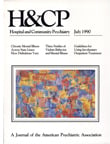Effects of Long-Term Psychiatric Hospitalization for Young, Treatment-Refractory Patients
Abstract
Although short-term hospitalization has been shown to be effective in helping severely impaired psychiatric patients improve, such improvement is for some only temporary. Young, treatment-refractory patients who have failed to respond to previous brief hospitalization and outpatient treatments may benefit more from longer-term hospitalization. The authors report on a three-and-a-half-year follow-up study of 55 young adult and adolescent treatment-refractory inpatients after long-term hospitalization. Significant improvements in recidivism, quality of life, and overall functioning were found between discharge and the follow-up assessment. The authors conclude that potential benefits of long-term hospitalization for this subgroup warrant further empirical study.
Access content
To read the fulltext, please use one of the options below to sign in or purchase access.- Personal login
- Institutional Login
- Sign in via OpenAthens
- Register for access
-
Please login/register if you wish to pair your device and check access availability.
Not a subscriber?
PsychiatryOnline subscription options offer access to the DSM-5 library, books, journals, CME, and patient resources. This all-in-one virtual library provides psychiatrists and mental health professionals with key resources for diagnosis, treatment, research, and professional development.
Need more help? PsychiatryOnline Customer Service may be reached by emailing [email protected] or by calling 800-368-5777 (in the U.S.) or 703-907-7322 (outside the U.S.).



